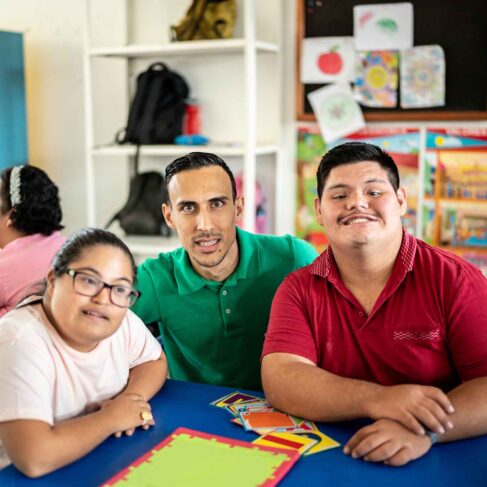Stay connected
Be the first to know about new programs, upcoming events, or other exciting opportunities happening at the University of Georgia by joining our mailing list.
About this course
What you’ll learn
- The roles of school system personnel and the policies
- Educational terminology
- The difference between interpreting and translating
- Procedures that educational interpreters must follow
- How to apply the Interpreter’s Standards of Practice and Code of Ethics to real-life scenarios you may encounter
- Roles of interpreters when working with special student populations and their families (such as preschool children, at-risk students, students with disabilities, and Special Education students)
- How to use consecutive, simultaneous, sight translation and summarization translation modes
Learning objectives
Module 1: Introduction to Terminology for the Professional Interpreter in Education
- Recognize the essential work of professional interpreters in education
- Identify the impact of communication on family engagement
- Understand the importance of interpreter training
- Review the difference between an interpreter and a translator
- Know the difference between a certificate and a national certification process
Module 2: Language Access Legislation, School Organization and Important Policies
- Describe and understand the background of language access in the educational setting
- Recognize the specific roles of school system personnel and the policies and procedures that educational interpreter must follow
Module 3: Interpreter Standards of Practice and Code of Ethics
- Demonstrate knowledge of the interpreter’s Standards of Practice and Code of Ethics
- Discuss and define the appropriate application of the Code of Ethics to case scenarios
Module 4: Common Types of Meetings in Education
- Compare and contrast the various types of meetings where interpreters build and strengthen connections between families and educators
- Expand your glossaries to include common terminology that interpreters will hear during these meetings
Module 5: Interpreter Roles, Responsibilities and Modes
- Compare and contrast the consecutive, simultaneous, and sight translation modes
- Identify the roles of the interpreter and situations when each role comes into place
- Recognize the responsibilities of a professional interpreter in education
Module 6: Disciplinary Hearings and Special Education Overview
- Understand procedures related to discipline and special education
- Define the components of an Eligibility and Individualized Education Plan.
- Define the role of the interpreter when collaborating during disciplinary hearings and special education sessions.
- Analyze the interpreter’s role and mode of interpretation during meetings with legal terminology
Module 7: Interpreter Tools: Note-Taking, Memory Skills and Meeting Management Strategies
- Understand the basics of note-taking and its value to improve consecutive interpretation
- Use strategies to increase memory capacity and apply them to consecutive interpretation exercises
- Identify ways to manage the flow of communication during a meeting and use effective intervention phrases when needed
Module 8: Course Wrap-Up, Post-Test, Final and PD Plan
- Expand your resources and continue exploring ways to build your skills as a professional interpreter in education
- Create a professional development action plan
- Review your knowledge of interpretation in the school setting and assess you learning throughout the course
Who should attend?
Individuals who are bilingual and fall into the following categories:
- Teachers, staff, administrators of public, private or charter schools, and other education institutions
- Individuals who work with teachers, staff and administrators of public, private or charter schools and other institutions
- Interpreters and translators currently employed in educational institutions
- Independent interpreters
- Interpreters with other interpreting credentials, such as those who have completed the Spanish/English Medical Interpreter Certificate Program (Opens in a new window) or the Spanish/English Legal Interpreter Certificate Program (Opens in a new window).
- Individuals seeking employment in educational organizations
- Individual seeking their first professional interpreting certificate
Continuing Education Information
Successful graduates will earn a Digital Certificate of Program Completion and 3.0 CEUs from the University of Georgia.
Requirements & policies
Schedule
Live online classroom sessions with the instructor will be held from 6:30 p.m. – 8:30 p.m. EST on the following Wednesdays:
- July 29
- August 12
- August 26
- September 9
The instructor will be available for office hours on August 5, August 19, and September 2.
Cancellation or refund
We will issue a refund, minus a $75 processing fee, for cancellations made at least seven (7) days before the course start date. No refunds for cancellations after that date. All cancellation and refund requests must be submitted via the “drop request” feature in the participant (registration) portal.
Prerequisites
There are no prerequisite courses, however, students must be fluent in both English and a second language to complete the certificate requirements. This course requires the equivalent of Advanced Mid or higher on the American Council on the Teaching of Foreign Languages (ACTFL) Oral Proficiency Assessment (OPI). Please see the ACTFL website (Opens in a new window) for more information regarding proficiency guidelines. For prospective students who are unsure of their proficiency level, we highly recommend taking the Oral Proficiency Assessment (OPI) before registering for the course.
People
Instructor
Ana Soler, the course author and instructor, is the Chairperson of the National Association of Educational Translators and Interpreters of Spoken Languages (NAETISL) and Founder of SeSo, Inc., a source of qualified and trained interpreters and multicultural family engagement workshops. She completed her bachelor’s degree in Social Work at Georgia State University, her master’s degree in Public Health at Emory University, and is a Ph.D. in Special Education student at the University of Georgia. For over a decade, Ana worked with the largest school district in Georgia as the Language Services and Parent Outreach Coordinator, developing, implementing, and evaluating professional development opportunities for multilingual personnel and supporting schools with interpreter/translator quality assurance.
While working as a Multicultural Program Coordinator for Children’s Healthcare of Atlanta, Ana assisted with the creation of the hospital’s interpretation and translation department. She also coordinated interpreter training for bilingual staff, oversaw cultural competency training for physicians and staff, and provided medical translation quality assurance and guidelines. Ana has authored interpreter training curricula nationally, including the Intercultural Parent and Youth Leadership Program, the Interpretation Academy for Bilingual High School Students, the Arkansas Interpreter in Education Credential Training, a 40-hour course for medical interpreters, and other online courses for the University of Georgia, including the Professional Interpreter in Education Certificate course and the Professional Interpreter in Special Education Certificate course. She remains an active medical and educational interpreter and translator.

Prices, course details, dates, and times are subject to change.
Contact us + FAQs
FAQs
View the most frequent questions asked by our learners
Financial and Military Assistance
Find out which programs are eligible for assistance
Accommodations
View our accommodation policy





